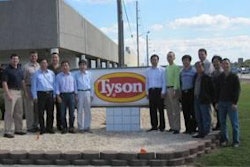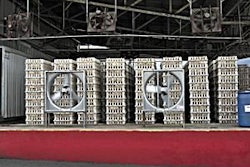Hyperspectral (HS) imaging may be a viable alternative to x-ray imaging when identifying bone, bone fragments and other physical hazards in poultry meat, according to the results of a research project at North Carolina State University.
In the course of the research, broiler fillets were compressed to a thickness of 1 centimeter for studying the fusion of HS transmittance and reflective imaging, which is a non-ionized and non-destructive imaging technique. Experimental results with fillets resulted in a detection accuracy of 100% for bones greater than 2 centimeters in length. However, the false-positive rate was 10%, primarily from thick fatty material, indicating further refinement is necessary prior to commercial use.
Attempts to detect embedded bones in thigh meat were less successful, according to researchers.

















